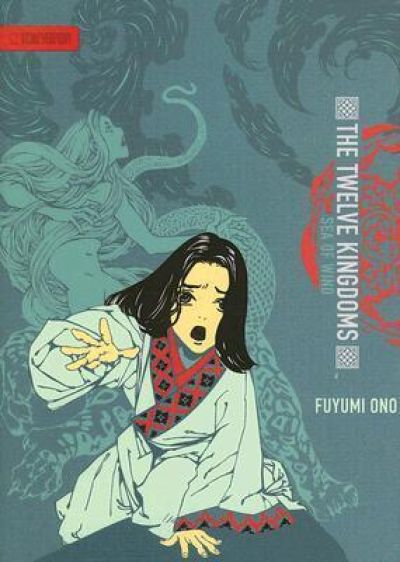The Dreams That You Dare To Dream
Sea of Wind (The Twelve Kingdoms, volume 2)
By Fuyumi Ono

8 Jun, 2017
0 comments
1993’s portal fantasy Sea of Wind is the second volume in Fuyumi Ono’s Twelve Kingdoms series. The 2007 English language edition was translated by Alexander O. Smith and Elye J. Alexander.
Taiki spent his childhood wracked with guilt for continually disappointing his judgmental grandmother, who never fully explained what he had done wrong. Small wonder that the ten-year-old leapt at a mysterious summons from another realm. Bye granny! Destiny awaits!
Destiny and, it turns out, heavy responsibilities and great danger.
Although he was born and raised in Japan, Taiki was conceived in the Twelve Kingdoms 1. Although he has the form of a human boy, in fact he is a kirin, on whose shoulders a great and terrible burden rests. Kirin are responsible for selecting the kings who rule the Twelve Kingdoms.
Taiki is in the position of a feral child , trying to master at an advanced age skills he should have learned as an infant. It is not clear that he will be able to do so. Even if he succeeds, his grandmother’s incessant bullying may have left him too emotionally damaged to accept his own competence. He cannot even shapeshift; how will he be able to carry out his duties properly?
He has no choice but to try. The King of Tai is dead. He is Tai’s designated kirin. Only he can choose the new king from all the would-be candidates. Under enormous pressure to perform, he makes his choice: intimidating Lord Gyoso, an impressive and skilled soldier, will be the next king.
Taiki has no way to know if he chose correctly. He fears he has not. But the gods will know … and may punish him for his failure. What will the penalty be? Taiki cannot guess. But he suspects that he and the entire world will find out eventually.
~oOo~
This was the second book in the series ( Sea of Shadows, reviewed here , was the first).Two books is not a large sample, but I do see similarities in the protagonists. Both Taiki (protagonist of this novel) and Yoko (the protagonist of the previous) were mistreated, isolated children. Yoko is distrusted by her community because she looks different. Taiki appears to look exactly like those around him, but it was his bad luck to be raised by a grandmother whose approval he could never win. The rest of the family appears to follow her lead. The author seems to painting her native Japan as a judgmental, conformist society.
I should point out that Japan is not the only society that might be described thus; there are too many best-selling books and popular tales about mistreated, misunderstood juveniles for anyone to think that their society is exempt from criticism.
Where Yoko spends much of her time in the Twelve Kingdoms on her own, trying to work out the rules of the world on the fly, Taiki is surrounded by caregivers and would-be mentors. This does him little good. In part this is because his teachers don’t quite grasp how profound his ignorance is. They tell him many things but, as it turns out, these are not the right things. In addition, having spent ten years in the care of his abusive granny, he lacks the confidence to challenge anything he is told, or even to accept that perhaps he’s not a complete screw-up.
It’s not clear to me where poor Taiki could go from here. Kirin are expected to advise their king, but Taiki is so crippled by self-doubt and ignorance that I cannot see how he could do so. Those raised in the Twelve Kingdoms have enormous faith in his instincts — yet it’s also clear (from a glance at any Kingdoms history) that from time to time the divinely mandated system of governance goes horribly wrong. The book ends on an up-note but can that be sustained? Tune in next novel to find out.
This edition of Sea of Wind is out of print, although I see Amazon is happy to sell you a copy here. Otherwise, consult your local used bookstores.
Please email corrections to jdnicoll at panix dot com.
1: I don’t think I can do justice in the space available to the process by which a magical fruit ended up in a Japanese woman’s womb, so let’s just say “a wizard did it.” OK, actually a magical wind.
